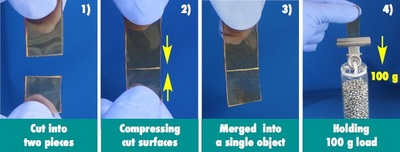
A Japanese chemistry researcher has accidentally discovered a unique material called polyether thioureas, which is closer to acrylic but not really glass, while searching for an adhesive in his lab at the Hongo campus of the University of Tokyo.
The new type of glass has self-healing property. Even if broken, it can be repaired by simply pressing it back together using bare hands, at room temperature. The discovery may soon find its application in a variety of products ranging from car windows to construction materials, fish tanks among others.
Yanagisawa, who was a research student in the lab of Prof. Takuzo Aida, told AFP:"It is not realistically about fixing what is broken, more about making longer-lasting resin glass... We may be able to double or triple the lifespan of something that currently lasts for 10 or 20 years."
Unlike the noncrystalline, high molecular weight polymers used for glass materials, the new low molecular weight polymers, when cross-linked by dense hydrogen bonds, "give mechanically robust yet readily repairable materials, despite their extremely slow diffusion dynamics," said researchers in their paper.
"The new material thiourea anomalously forms a zigzag hydrogen-bonded array that does not induce unfavorable crystallization. By inducing a structural element for the exchange of hydrogen-bonded pairs enabled the broken portions to rejoin readily upon compression," they explained.
Yu Yanagisawa, who went on to win a CSJ Student Presentation Award in 2016 for his unique discovery, said the first polymer glass that can self-heal has the ability to provide extended lifespan by three times with huge potential for industrial applications.
Self-adhesive glass or polymer material has gained world attention in recent years, especially for their potential use in smartphones. Researchers from the University of California suggested the use of polymers that heal breaks after 24 hours and could stretch up to 50 times its original size.
Recently, Motorola patented a display that fixes its own cracks when heated at around 120°C or more. But Yanagisawa's newly discovered polymer could self-heal when manually compressed for just 30 seconds at 21°C.
"I hope the repairable glass becomes a new environment-friendly material that avoids the need to be thrown away if broken," he told Japan's NHK TV channel in an interview.









